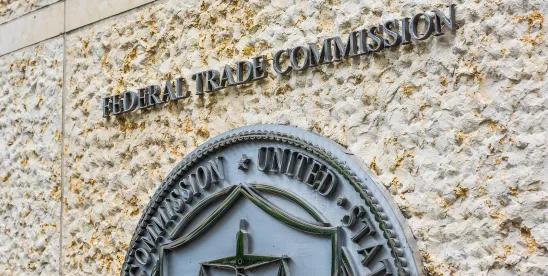The battle over the Federal Trade Commission’s (FTC’s) rule that would have banned noncompete agreements nationwide (the Rule) took another dramatic turn in recent days. On August 20, 2024, Judge Ada Brown of the United States District Court for the Northern District of Texas rendered a much-anticipated decision and order to plaintiffs Ryan, LLC and Intervenors U.S. Chamber of Commerce’s (the plaintiffs’) challenge to declare the Rule unenforceable. Judge Brown granted the plaintiffs’ motion for summary judgment declaring the Rule unenforceable. Most importantly, the Court declared that the injunction barring enforcement of the Rule would be effective nationwide. As a result, the Rule will not take effect on September 4, 2024.
As previously reported, on July 3, 2024, Judge Brown granted the plaintiffs’ motion to preliminarily enjoin the FTC from enforcing the Rule. In that decision, the Court concluded that there was a substantial likelihood that the plaintiffs would succeed on the merits – including the conclusions that (1) the FTC exceeded its statutory authority and (2) the Rule is arbitrary and capricious – and that the Rule would cause “irreparable harm” to the plaintiffs.
In the Court’s most recent decision, the arguments under consideration were similar to the arguments raised in support of and in opposition to the plaintiffs’ motion to stay and for a preliminary injunction. There were two bases for the Court’s decision, namely (1) that the FTC’s rule exceeded its statutory authority and (2) that the Rule is “arbitrary and capricious.” In making its decision, the Court referenced its authority based on Loper Bright Enterprises v. Raimondo (the recent U.S. Supreme Court decision that overturned the “Chevron Doctrine”) when it exercised its independent judgment in deciding whether an agency has acted within its statutory authority, and the scope of its decision nationwide.
Court Analysis for the FTC Exceeding Its Authority
In consideration of whether the Rule exceeded the FTC’s authority, the plaintiffs argued that the Rule exceeded the FTC’s statutory authority on the three grounds:
“(i) the FTC Act does not authorize the Commission to issue substantive unfair-competition rules, (ii) categorically prohibiting all worker noncompete agreements as “unfair methods of competition” cannot be squared with the meaning of that phrase in section 5 of the FTC Act, and (iii) the Commission lacks statutory authority to retroactively invalidate millions of existing contracts.”
In response, the FTC argued that the Rule did not exceed its authority because Congress authorized the Commission in clear language to prevent unfair methods of competition through both adjudication and rulemaking.
The Court concluded that the FTC has some authority to promulgate rules to preclude unfair methods of competition. However, the Court held that the FTC lacks the authority to create substantive rules through this method, determining that FTC authority is limited to procedure or practice as opposed to substantive rules, which is exhibited through, among other things, the history of the FTC Act and the lack of a statutory penalty for violating rules promulgated under the FTC Act.
Court Analysis on Why the Rule Is Arbitrary and Capricious
The plaintiffs also argued that the Rule is arbitrary and capricious for three reasons:
“(i) the FTC offers no evidence to support its categorical ban on noncompetes, (ii) the Commission unjustifiably dismissed alternatives that would have allowed the Commission to achieve its purported objectives at lower cost, and (iii) the Commission relied on a flawed cost-benefit analysis to prop up its Rule.”
In opposition the FTC argued that “the Commission easily satisfies the deferential arbitrary-and-capricious standard given its exhaustive study of noncompetes and through economic justification for the Rule.”
In determining that the Rule is arbitrary and capricious, the Court acknowledged that the FTC relied on a handful of studies that examined the economic effects of various state policies toward noncompetes. However, the Court found it important that no state enacted a noncompete rule as broad as the FTC’s Rule. Instead, the Court noted that the FTC’s evidence compares different states’ approaches to enforcing noncompetes based on specific factual situations, which the Court concluded is inconsistent and flawed empirical evidence.
The Court explained that the FTC provided no evidence or reasoned basis as to why they chose to impose such a sweeping prohibition. Ultimately, the Court determined that the FTC dismissed any possible alternatives without sufficiently addressing alternatives to issuing the Rule. Consequently, the Rule failed to fall within the zone of reasonableness and was held to be arbitrary and capricious.
Conclusion
As opposed to the Court’s earlier decision limiting the stay and preliminary injunction to the plaintiffs, the Court concluded that the Administrative Procedures Act does not contemplate party-specific relief. The Court relied on case law in the Fifth Circuit, which holds that “setting aside agency action has nationwide effect, is not party-restricted, and affects persons in all judicial districts equally.” Therefore, the Court determined that the summary judgment decision made the Rule unenforceable nationwide.
This is a significant decision considering the recent court decision in the Eastern District of Pennsylvania, covered in our recent article on ATS Tree Services, LLC v. FTC, et al., where the court denied the plaintiff’s motion for preliminary injunction and determined that the Rule was within FTC authority. This decision will likely provide “cover” to employers who seek to keep in place their noncompete agreements. Although this is a temporary victory for those that support the use of noncompetes, it is unlikely the end to the fight over them. Therefore, it is important for employers (and employees) to review their employment contracts to prepare for the inevitable challenges that are bound to come in the world of restrictive covenants.




 />i
/>i

